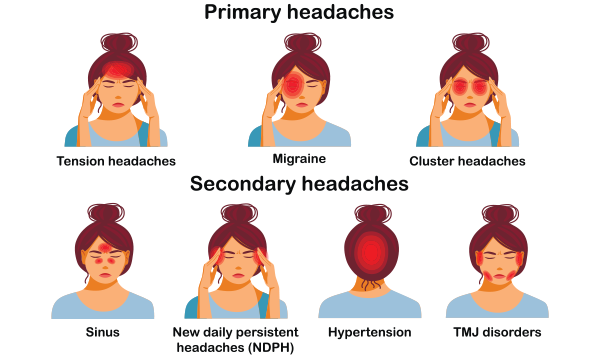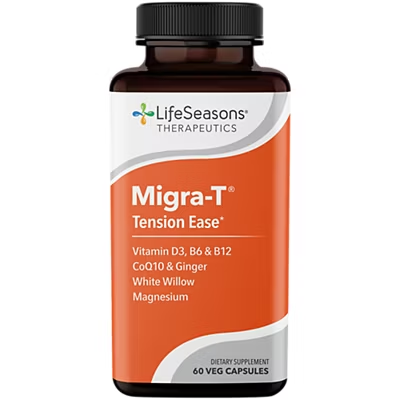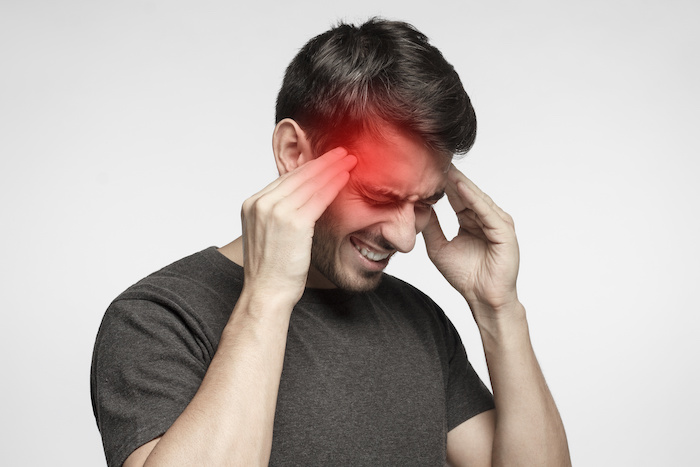
A headache is a common condition characterized by pain or discomfort in the head, scalp, or neck. It can range from mild to severe and may last from minutes to days. Headaches can be a symptom of another condition or occur on their own.
🔹 Types of Headaches
There are two main categories:
- Primary Headaches – not caused by another condition.
- Tension headaches (most common)
- Migraine
- Cluster headaches
- Secondary Headaches – caused by another medical condition.
- Sinus infections
- High blood pressure
- Head injury
- Medication overuse
- Dehydration, etc.

🔹Common Causes of Headaches
1. Lifestyle-Related Causes
- Stress or anxiety
- Lack of sleep or irregular sleep schedule
- Hunger or skipping meals
- Dehydration
- Caffeine withdrawal (e.g., missing your usual coffee)
- Overuse of painkillers (can cause rebound headaches)
2. Physical/Environmental Causes
- Eye strain (from screens or poor lighting)
- Poor posture (neck/back strain)
- Loud noises or bright lights
- Strong smells (perfume, chemicals, etc.)
- Weather changes (barometric pressure drops)

🔹Solutions for headaches
1. Natural/Home Remedies
- Cold compress (on forehead) – great for migraines
- Warm compress (on neck or shoulders) – helps tension headaches
- Peppermint or lavender oil – apply to temples
- Caffeine – small amounts can help, but don’t overdo it
2. With supplements
Some natural vitamins and supplements may help reduce the frequency or severity of headaches, especially migraines.
✅ Magnesium
How it helps: Supports nerve function and may prevent migraine attacks
Dose: 400–500 mg/day (consult your doctor)
Best for: Migraines, menstrual headaches
Note: May cause diarrhea in high doses
✅ Riboflavin (Vitamin B2)
How it helps: Boosts energy production in brain cells; reduces migraine frequency
Dose: 400 mg/day
Best for: Migraine prevention
Safe for: Long-term use under guidance
✅ Coenzyme Q10 (CoQ10)
How it helps: Improves energy production in brain cells
Dose: 100–300 mg/day
Best for: Migraines
Note: Takes several weeks to see effect
✅ Feverfew (herbal supplement)
How it helps: May reduce inflammation and prevent blood vessel dilation
Dose: 50–150 mg/day (standardized to contain parthenolide)
Best for: Migraine prevention
Note: Not for use during pregnancy
✅ Butterbur (herbal root extract)
How it helps: Anti-inflammatory; relaxes blood vessels
Dose: 75 mg twice daily (use PA-free form only to avoid liver toxicity)
Best for: Migraine prevention
Caution: Must be PA-free (free of harmful pyrrolizidine alkaloids)
✅ Vitamin D
How it helps: Low vitamin D levels are linked to chronic headaches
Dose: Based on blood test (often 1,000–2,000 IU/day)
Best for: People with deficiency
✅ Omega-3 Fatty Acids (Fish Oil)
How it helps: Reduces inflammation
Dose: 1–2 grams/day (EPA + DHA)
Best for: General headache prevention
And this is the complement that combines these vitamines :

